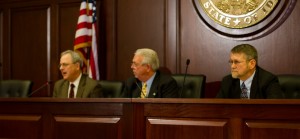Sharp Words On Personal Property Tax Ahead Of Gov. Otter’s State Of The State Address

Aaron Kunz / Boise State Public Radio
The panel included Attorney/CPA Rick Smith, Association of Counties executive director Dan Chadwick, and Idaho Center for Fiscal Policy director Mike Ferguson.
It’s on everyone’s list of key issues of the upcoming legislative session: the personal property tax.
Pressure is mounting for the state to repeal it, but even Republican lawmakers who say they are firmly against the tax also say the state doesn’t have the money to get rid of it at this time. Personal property tax revenue totaled $141 million in 2012, according to a recent report from the Idaho State Tax Commission.
Today’s legislative preview hosted by the Associated Press yielded several things to note. The governor said he is open to phasing out the personal property tax, and that there will be more specifics in Monday’s State of the State and Budget Address.
House Speaker Scott Bedke (R-Oakley) confirmed a rumor about the millions of dollars that were earmarked for schools, but were left without policy to guide their spending when voters rejected the education laws known as Students Come First. “You have money without a policy to spend it on,” Bedke said. “In this era of, ‘How are we going to pay for personal property tax?’ it’s no secret there are people who are eying some of this money.”
That provoked a sharp response from House Minority Leader John Rusche (D-Lewiston). “Our caucus would be adamantly opposed to that,” Rusche said.
Later, in an hour-long discussion focused on the personal property tax, starkly contrasting views were on display. Rick Smith, an attorney at Hawley Troxell, deployed a familiar vocabulary when talking about the tax. He called it burdensome, time-consuming, complex and unfair. Moreover, he said, it’s an economic drag.
“If we are looking for ways to boost the economy, to stimulate investment, stimulate businesses to locate in Idaho, in my mind, the best tool we would have would be to eliminate the personal property tax entirely,” Smith said. He acknowledged the majority of states do have a personal property tax. Exempting personal property, he said, would allow Idaho to create a selling point that other states don’t have.
The Idaho Center for Fiscal Policy’s Mike Ferguson, the state’s former chief economist, took the opposing view. “Eliminating Idaho’s property tax on business personal property is a misguided public policy decision and wrong for Idaho,” he said. He disputed that the tax is the administrative headache many claim it is, and highlighted the difficulty that exempting personal property could pose for school funding.
He also said the primary beneficiaries of the exemption would be big businesses, not the small mom and pop shops that opponents of the tax often invoke. Idaho Power, Ferguson said, stands to gain millions of dollars, as do other influential Idaho businesses including Simplot and Micron.
He pointed out that those are businesses that are already eligible for significant tax breaks. “For many of the largest firms it will be like hitting the trifecta: no sales tax, significantly reduced income tax, and now no personal property tax,” he said.
Dan Chadwick, Executive Director of the Idaho Association of Counties, offered a more moderate though still critical view of doing away with the personal property tax. “I don’t think there’s any question that the personal property tax is a lousy tax,” he said. “But it’s the cards we’ve been dealt as county government.”
Chadwick cautioned against repealing the tax without having a plan in place to help local government manage the revenue loss. “It isn’t enough to say, ‘Well, let’s repeal it and then let the dust settle and see if we can grow our way out of it,'” he said. “I think that’s an absolute impossibility.”


